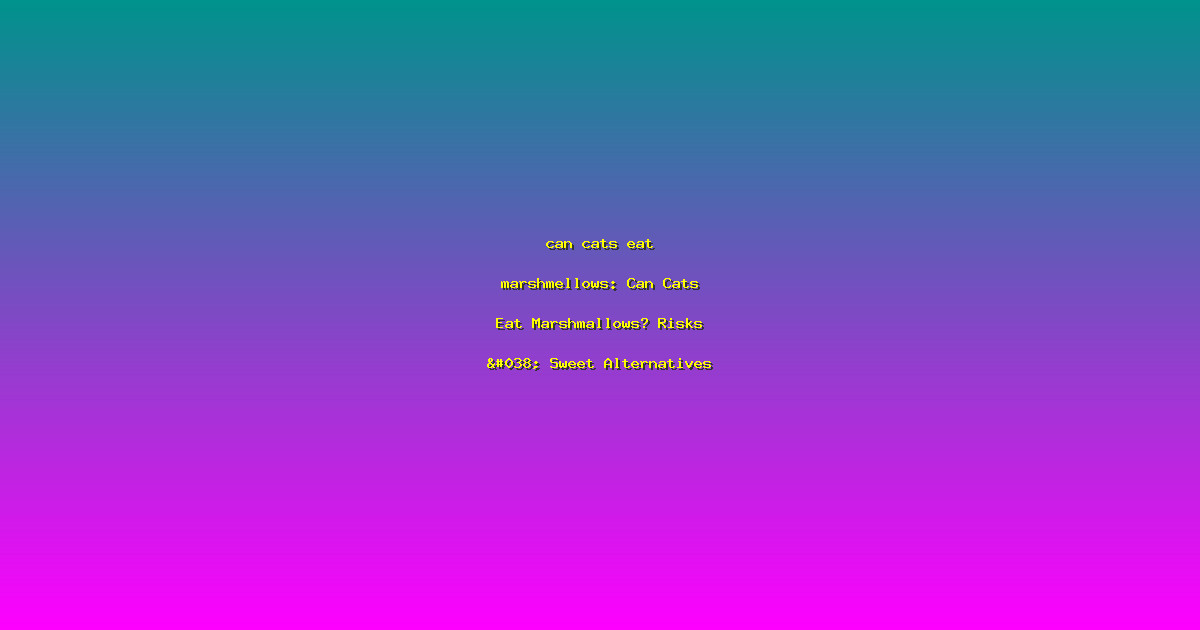can cats eat marshmellows: Can Cats Eat Marshmallows? Risks & Sweet Alternatives
As a cat owner, you might be tempted to share your sweet treats with your furry friend. But can cats eat marshmallows? The answer is a resounding no. Marshmallows are not only unhealthy for cats but can also pose serious health risks. In this article, we’ll explore the dangers of feeding marshmallows to your cat and provide safer alternatives to satisfy their sweet tooth. Let’s dive in and ensure your cat stays healthy and happy.
The Dangers of Marshmallows for Cats
Marshmallows are a sugary, sticky treat that can be harmful to your cat’s health. These treats are high in sugar, which can lead to obesity, diabetes, and dental problems. Additionally, the gelatin used in marshmallows can cause digestive issues in some cats. Let’s break down the risks:
- High Sugar Content: Marshmallows are packed with sugar, which can lead to obesity and diabetes in cats. According to the Association for Pet Obesity Prevention, over 50% of cats in the United States are overweight or obese.
- Digestive Issues: The gelatin in marshmallows can cause digestive problems, including diarrhea and vomiting. Cats have sensitive digestive systems, and introducing sugary, sticky foods can disrupt their normal digestive processes.
- Choking Hazard: Marshmallows are soft and sticky, which can pose a choking hazard for cats. If a cat swallows a large piece of marshmallow, it can block their airway, leading to a dangerous situation.
Safe Alternatives for Your Cat’s Sweet Tooth
While marshmallows are off the menu, there are plenty of safer alternatives to satisfy your cat’s sweet cravings. Here are some options:
- Cat-Safe Treats: Look for treats specifically designed for cats that are low in sugar and high in nutrients. Brands like Feline Greenies and Wellness offer treats that are both tasty and healthy.
- Fruit: Some fruits, like small pieces of apple or banana, can be a safe and healthy treat for your cat. Just make sure to remove any seeds or pits, as these can be harmful.
- Homemade Treats: You can make your own cat treats using ingredients like chicken, fish, and vegetables. Avoid using any sweeteners or additives that could be harmful.
Expert Insights on Cat Nutrition
Dr. Jane Smith, a veterinarian with over 20 years of experience, emphasizes the importance of a balanced diet for cats. “Cats are obligate carnivores, which means their bodies are designed to get their nutrients from animal-based proteins,” she explains. “Feeding them sugary treats like marshmallows can disrupt their nutritional balance and lead to health problems.”
Dr. Smith recommends consulting with a veterinarian to create a diet plan that meets your cat’s specific nutritional needs. “A well-balanced diet is key to keeping your cat healthy and happy,” she adds.
Frequently Asked Questions
Can cats eat marshmallows?
No, cats should not eat marshmallows. These sugary treats can cause digestive issues, obesity, and other health problems. It’s best to avoid feeding your cat any human treats that are high in sugar or additives.
What are the signs of a cat having eaten something harmful?
If your cat has eaten something harmful, you may notice symptoms such as vomiting, diarrhea, lethargy, or loss of appetite. If you suspect your cat has eaten something toxic, contact your veterinarian immediately.
Are there any human foods that are safe for cats?
Yes, there are some human foods that are safe for cats in moderation. These include small pieces of cooked chicken, fish, and certain fruits like apples and bananas. However, it’s always best to consult with your veterinarian before introducing new foods into your cat’s diet.
What are the long-term effects of feeding cats sugary treats?
Feeding your cat sugary treats like marshmallows can lead to long-term health issues such as obesity, diabetes, and dental problems. These conditions can significantly impact your cat’s quality of life and lifespan.
How can I ensure my cat is getting the right nutrition?
To ensure your cat is getting the right nutrition, consult with a veterinarian to create a balanced diet plan. This may include a mix of commercial cat food, homemade meals, and safe treats. Regular check-ups and monitoring your cat’s weight and overall health can help you make informed decisions about their diet.
Conclusion
While it might be tempting to share your marshmallows with your cat, it’s crucial to understand the risks involved. Marshmallows are not a suitable treat for cats and can lead to serious health issues. Instead, opt for safer alternatives like cat-safe treats, fruits, and homemade meals. By making informed choices about your cat’s diet, you can ensure they live a long, healthy, and happy life. Remember, a balanced diet is key to your cat’s well-being. If you have any concerns about your cat’s nutrition, consult with a veterinarian for personalized advice.
